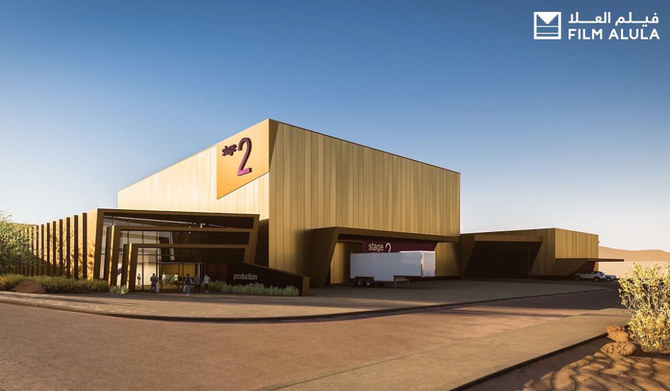JEDDAH: Film AlUla, the film agency of the Royal Commission for AlUla, has started construction on the first phase of its studio complex.
The finished complex will cover around 30,000 square meters and is set to be up and running by the end of next year.
The first phase will include two world-class soundstages, production support buildings, workshops, a pyro/sfx building, a sound recording studio, catering and administration buildings and a 6,500 square meter backlot.
HIGHLIGHT
The first phase will include two world-class soundstages, production support buildings, workshops, a pyro/sfx building, a sound recording studio, catering and administration buildings and a 6,500 square meter backlot. It is located near 12 sq. km of outdoor shooting locations showcasing the beauty and ancient heritage of AlUla, making it the best suitable for on-location filming and set construction.
It is located near 12 sq. km of outdoor shooting locations showcasing the beauty and ancient heritage of AlUla, making it the best suitable for on-location filming and set construction.
“AlUla is a thriving center for arts, culture and heritage. With the film and screen sector of central focus the first phase of this studio complex is carefully planned and part of a much larger program of infrastructure development,” said Charlene Deleon-Jones, executive director of Film AlUla.
“This complex will satisfy the growing demand from regional and international producers to shoot at AlUla, while also supplying an epicenter for our production ecosystem. The studio complex will diversify AlUla’s economy, in line with the objectives of RCU, as we build a home to nurture Saudi talent in the screen sector for generations to come,” he added.
Film AlUla worked with the US-based company Tait to ensure that work in AlUla would be uncluttered and comfortable, including during summer.
The studio complex will be 14 minutes from the Film AlUla Residence, which has 300 rooms, restaurants, recreational facilities and office space for industry professionals, and 20 minutes from AlUla International Airport, which recently opened a hangar for private jets. It lies outside the airport’s flightpath.
Phase two will be announced in the second quarter of 2023.
The project aims to attract local and international productions is bolstered by Saudi Arabia’s offer of a cashback rebate of up to 40 percent for international and local feature films, television series and documentaries.
The studio complex is also meeting rigorous environmental standards. Film AlUla contracted environmental agencies to conduct a 10-month impact assessment on the new location and will build it under continuous environmental monitoring.
Film AlUla has hosted 694 production days since opening in 2020. Movies include Kandahar, directed by Ric Roman Waugh and starring Gerard Butler, which was the first major Hollywood feature to shoot almost entirely in AlUla, and the Iraq war story Cherry, starring Tom Holland and directed by Anthony and Joe Russo.
Additionally, Norah was the first Saudi feature film to shoot at AlUla entirely and featured an all-Saudi cast and more than 40 percent Saudi crew.
A number of TV productions have been filmed in AlUla including the British series Expedition with Steve Backshall and Nat Geo documentaries, along with commercials, promotions, photo-shoots and short films.
























